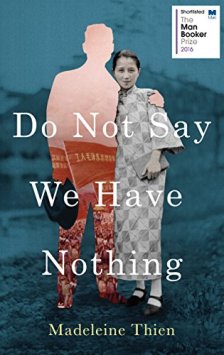 My second venture into the 2016 Man Booker shortlist was Do Not Say We Have Nothing, Madeleine Thien’s historical epic which takes the Chinese Cultural Revolution as its main backdrop. I don’t really know anything about Chinese history so I was looking forward to this novel as an educational experience as well as a fascinating family saga.
My second venture into the 2016 Man Booker shortlist was Do Not Say We Have Nothing, Madeleine Thien’s historical epic which takes the Chinese Cultural Revolution as its main backdrop. I don’t really know anything about Chinese history so I was looking forward to this novel as an educational experience as well as a fascinating family saga.
Initially, I found this really difficult to get into; the novel begins in the 1990s, with the ostensible narrator Marie as a ten-year-old, welcoming a surprise guest into the Toronto home she has shared with just her mother since her father left them, returned to China and died. So there’s something of a mystery at the heart of Do Not Say We Have Nothing, as Marie gradually finds out more about her father, his life and his disappearance. Ai-Ming, the sudden visitor, is fleeing China after the protests at Tiananmen Square, and has some information to share about their shared background.
All this intrigued me. The problem was that, very quickly, the narrative shifts to the historical, beginning with past generations of Ai-Ming’s family and their struggles in 1960s China. Perhaps my ignorance regarding this era was the problem, but it took me a very long time to build any interest in this increasingly lengthy part of the book; I eventually did, but then found the sections set in the modern era dull and irrelevant, so basically there’s just no pleasing me. During the larger chunk of the novel, I found that there was too much of a disconnect between the two eras being described, with the more modern one not really offering very much in the way of narrative interest. As events, both historical and fictional, come to their climax, however, the book becomes far more coherent and engaging.
What really struck me about Do Not Say We Have Nothing was its depiction of a country in which people had no real choice in their trajectory of their lives, and for long periods lived in fear that they would be deemed dangerous and sent to a labour camp. Even as this danger alleviates, characters are still separated from their loved ones by arbitrary government decisions, which affected me deeply. The last 100 pages of the novel were really compelling and made me want to read more about this period in Chinese history. I was struck by the extent to which the treatment of the students at Tiananmen Square, as well as the dictatorial activities of the government, seemed to belong in a dystopian novel rather than a historical one.
I’ve now read two of the six books on the Booker shortlist and, although both are very good in their own right, I’ve not found either of them particularly outstanding. I’m holding all serious contemporary fiction up to the standard of Jonathan Safran Foer’s Here I Am at the moment, given that it is one of the best books I’ve read this year and, shockingly, wasn’t even longlisted for the Booker (if my understanding of the rules is correct, it would have been eligible). Neither Eileen nor Do Not Say We Have Nothing is at the level of Here I Am, in my opinion, although Thien’s novel, in terms of sheer scope, is edging it so far in my consideration of the shortlist. I think this may change with my next foray into the list: Paul Beatty’s The Sellout.

2 thoughts on “Review: Do Not Say We Have Nothing by Madeleine Thien”